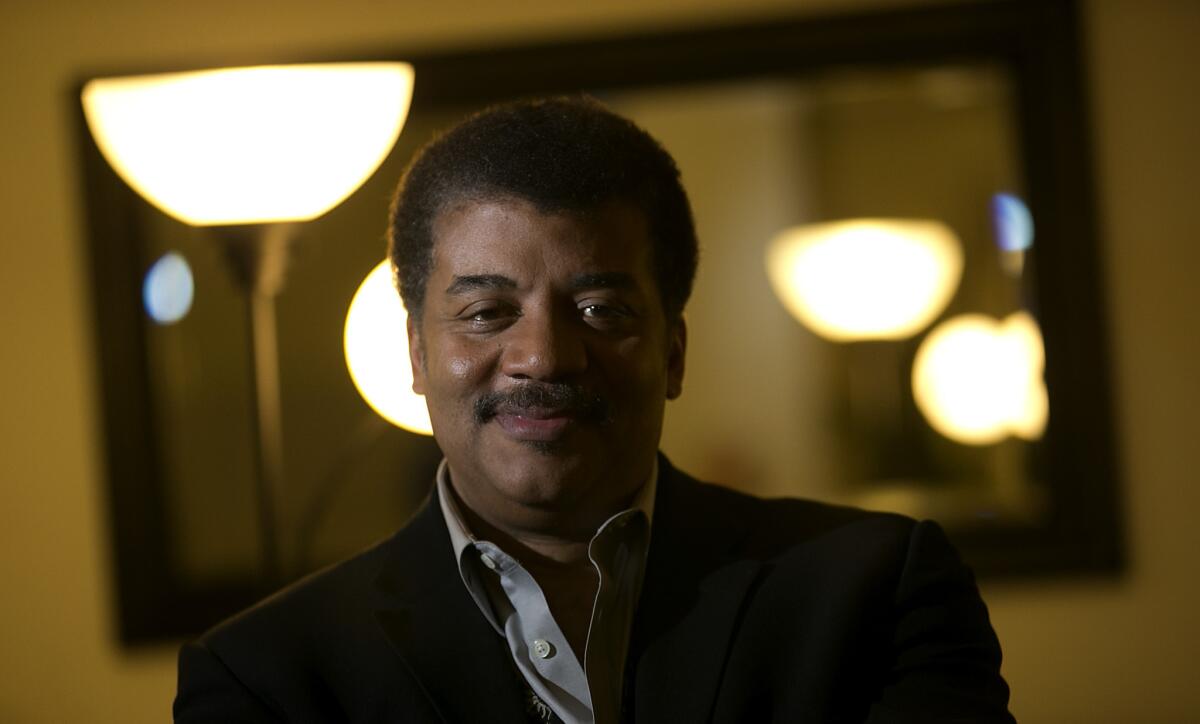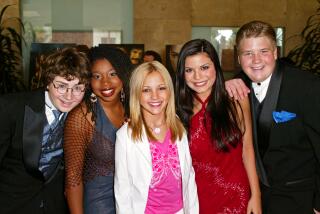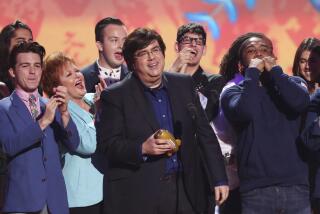Review: Neil deGrasse Tyson’s theory: ‘StarTalk’ can make science hip

Astrophysicist Neil deGrasse Tyson, the American face of science, has a new talk show — or rather, he has an old talk show moving from the Internet to television Monday. It’s called “StarTalk,” a science-and-comedy rap session he has hosted since 2009, mainly as an audio podcast but also on video via the Nerdist network, which now becomes a weekly late-night offering of National Geographic Channel.
This is news, even big news, even if Tyson is not exactly going head to head with the daily “The Daily Show,” which like “StarTalk” airs at 11 p.m., or any network talk show. In light of the ongoing discussion about diversity in late-night television, it’s notable that he adds another African American host to the mix.
But what’s perhaps most exciting is that he’s bringing a scientist’s perspective into that mix — it’s an idea whose time has seemingly come and, in a time when many people with influence believe that established facts are things to be voted on, an idea that can’t come too soon.
“Pop culture at face value views science as this other thing,” Tyson said recently by phone from New York City, where he lives and works. “Until you realize that science is everywhere, it affects everything that you do, it affects how you communicate, it affects your health, it affects your future, it affects your wealth. And ‘StarTalk’ is an exercise in highlighting for the public what role science actually plays in the survival of society.”
As Tyson says in Monday’s opening episode — which features “Star Trek” navigator and Twitter star George Takei as its guest — he wants “to collide pop culture with science,” a meeting of worlds the host represents in his own person. He has been a familiar figure on talk shows and beyond, making cameos on “The Big Bang Theory” and “Stargate Atlantis,” in a Superman comic and on Reddit.
Currently the director of the Hayden Planetarium at the American Museum of Natural History in New York, Tyson, 56, has been creeping into the national consciousness — a progress that reached a kind of critical mass last year when he hosted “Cosmos: A Spacetime Odyssey,” a Seth MacFarlane-produced remake of Carl Sagan’s “Cosmos: A Personal Voyage.” The 13-episode series aired simultaneously on National Geographic Channel and Fox and spawned the latest of Tyson’s several books.
A friendly bear in a painted tie next to Sagan’s turtlenecked Zen panther, if some highly nonscientific descriptions may be allowed, Tyson is science-casual. He’s an academic with a goofball streak, a big kid with a doctorate who says things like, “I just wanted to sort of chill with George Takei and get his reaction to [‘Star Trek’] stuff that came true.”
Tyson to Takei: “The Kardashians have been on longer than [the original] ‘Star Trek.’”
Takei: “But on ‘Star Trek’ we had the Cardassians.” If you laughed knowingly at that, this is the show for you.
Part of his outreach has been to appear in nightclubs and at festivals flanked by comedians, often in the company of “Bob’s Burger’s” actor and stand-up comic Eugene Mirman.
“I’ve always been a fan of comedians,” Tyson said. “I think they’re modern-day anthropologists, as preservers of prevailing cultural and social mores. We’ve known from the beginning that we wanted my cohosts to be professional comedians — not the kind who tell one-line jokes, ‘Did you hear the one about the,’ not that kind of comedian, but the kind of comedian who is an astute observer of our society, of life, of culture.”
The TV version preserves the form and excited tone of the podcast, with better production values and a bigger stage — it’s recorded at the Natural History museum, in the host’s office and in “the Rose Center for Earth and Space, the Hall of the Universe.” (“So many names for one giant room,” says Mirman.)
Each week, Tyson privately interviews a big figure from the world of art or science or politics — Christopher Nolan, Dan Savage, Richard Dawkins, Jimmy Carter, Arianna Huffington and Norman Lear are featured in the show’s initial episodes — then plays clips and riffs on them with a comedian cohost (including Leighann Lord, Mirman and podcast regular Chuck Nice) and a relevant expert. Bill Nye (the Science Guy) appears in brief filmed episodes to “rant” on related themes.
The talk runs in fractal curlicues, from the shape of space to the human propensity to discriminate and the historical mutability of stereotypes, automatic doors, chalkboards, enchiladas, putting wine in a blender and the “Star Trek” warp drive, which Tyson admits, to the apparently genuine gasps of his interlocutors, to have “incorrectly described in my past.”
He thought it was a matter of folding space like a napkin. “That is so wrong,” he’s told. “You wrap the Enterprise in a subspace field and then you travel faster than light.”
There is a small, dimly heard audience, “but not such as what you might find on Jimmy Fallon,” said Tyson. “There are some chairs and cocktail tables, and those fill up rapidly with friends of friends and local folks; we’re not really an audience-driven product, but there’s an audience-reaction sounding board.”
I mentioned the rock-star reception that evolutionary biologist Dawkins had received, before a much larger audience on one of Tyson’s podcasts and wondered whether we might be seeing a renaissance of popular interest in scientific matters.
“Yes,” he said, “but ‘renaissance’ implies that it’s being reborn. I think it’s a first rise, a science appetite being revealed in the hearts and minds of the public. And among the various points of evidence we point to, there is the wholly unpredicted success of the TV sitcom ‘The Big Bang Theory.’ I think if you had been a network executive and someone walked up and said, ‘I have an idea — let’s have five scientists and an engineer and they’re all friends and they talk about their job, speak science fluently, and half the time you will not explain what it is they’re saying — that’d be a great show, wouldn’t it?’ — you’d be out on the street five minutes later.”
Would that show have been inspirational to him in his youth?
“Oh, I would have loved it. I loved ‘I Dream of Jeannie’ because the main character [an astronaut] used a slide rule to figure things out in his office. I thought, ‘Hey, he’s an engineer, and he’s using his brain.’ Oh, yeah, I would have been all over it.
“What this tells me is that this interest has been real, but it’s been undercapitalized because we somehow as a culture don’t think that science is fun or entertaining or a source of comedy. There’s a bias. And I think the universe is a hilarious place.”
For instance?
“I think it’s hilarious what happens to you when you fall into a black hole,” said Tyson, without irony. “You get stretched and ripped apart — it’s not so much hilarious as entertaining. If I had to pick one way to die, that’s how I’d want to die. It’s far more interesting than getting hit by a bus.”
------------
‘StarTalk’
Where: NGC
When: 11 p.m. Monday
Rating: TV-PG-L (may be unsuitable for young children with an advisory for coarse language)
More to Read
The biggest entertainment stories
Get our big stories about Hollywood, film, television, music, arts, culture and more right in your inbox as soon as they publish.
You may occasionally receive promotional content from the Los Angeles Times.







